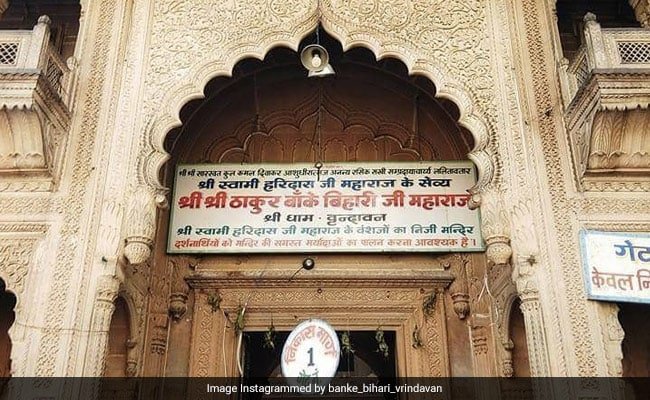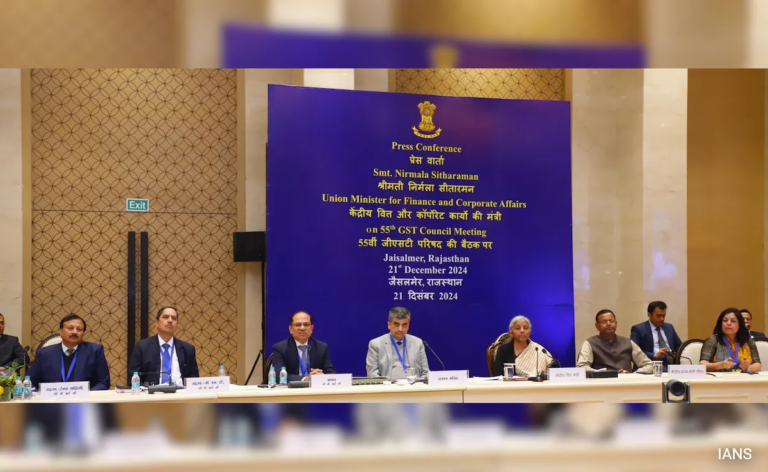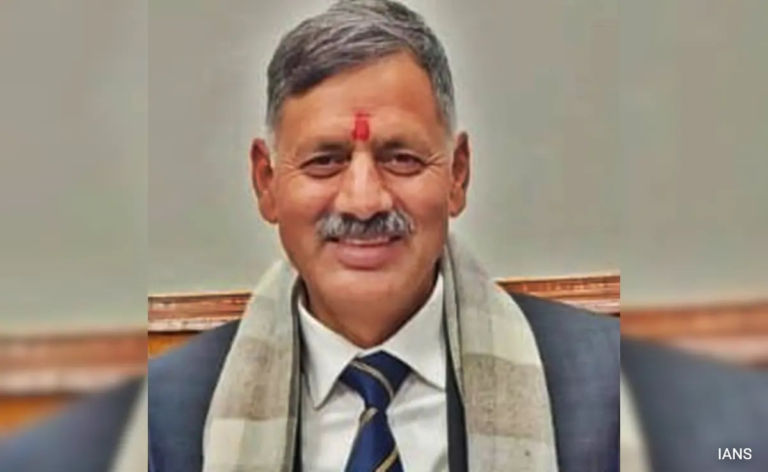
The Kuki-Zo tribes deny Manipur’s Thangjing hill is exclusively a sacred site of the Meiteis
Imphal/Guwahati/New Delhi:
A cross has been installed atop a hill near Manipur’s Moirang town in an act seen as destabilising in the violence-hit state, as the hill has a shrine that the residents of this lakeside town under Bishnupur district, 60 km from the state capital Imphal, consider sacred and ancient.
Moirang’s Meitei community had been going for pilgrimage to Thangjing hill, the home of the deity Ibudhou Thangjing. They believe the Thangjing hill site to be at least 2,000 years old. The tribes call this hill range Thangting, which falls under Churachandpur district. The renaming to Thangting in December 2015 by the then Congress government in the state had led to tension among communities.
Undated visuals show a priest leading a group of people carrying the cross to the hilltop, where after installing it they were seen praying. Some men armed with assault rifles are also seen guarding the priest. The armed men are suspected to be insurgents who have signed a tripartite ceasefire with the state government and the Centre, sources said, adding their act violated the ceasefire conditions.
The Kuki-Zo tribes deny the hill is exclusively a sacred site of the Meiteis.
Ginza Vualzong, the spokesperson of the Kuki-Zo group Indigenous Tribal Leaders’ Forum (ITLF), denied encroachment on any sacred site of the Meitei community. “The cross is a symbol of Christianity and can be seen in all the houses of a Christian. Erecting a cross at Thangjing hill is also a form of showing our faith and religion. This should not be taken as something done against any other religion,” Mr Vualzong told NDTV today.
“Thangjing is a Christian place and to put up a cross is just a show of faith. Had the cross been erected in a Meitei area, then we may not have the right to put up the cross,” he added.

The cross was installed on January 25, sources said, despite a Supreme Court order on December 16, 2023 that the Manipur government should ensure all religious buildings including churches and temples are protected. The Supreme Court order came in response to vandalism of 386 religious structures – mostly churches and some temples – following the outbreak of ethnic clashes between the hill-majority Kuki-Zo tribes and the valley-majority Meiteis.
This Thangjing hill range lies between Moirang town and Churachandpur district, 40 km apart. Churachandpur and nearby areas are where ethnic violence began on May 3, 2023. The people in Moirang – home to the northeast’s largest freshwater lake Loktak – consider the deity Ibudhou Thangjing the area’s guardian.
In October 2023, photos taken with powerful zoom lenses and drone footage had confirmed the installation of another cross on the hill. Moirang MLA Thongam Shanti had told NDTV the cross came up on the same spot where the shrine of Ibudhou Thangjing stood.
Then too, the ITLF had refuted allegations of desecration of any sacred site of the Meiteis. “The cross is a sign of Christianity; it is seen in many parts of our land, be it in churches or homes. As it is a symbol of our religion, to erect a cross at the Thangting range is normal and an expression of our faith. Since it does not encroach on anyone’s land, I do not see an issue here,” Mr Vualong had told NDTV.

After the Supreme Court order in December, the Manipur government was expected to come up with a proposal to protect places of worship and properties of internally displaced people.
The alleged desecration of the sacred site on Thangjing hill at a time when tensions are still high and people are dying in gunfights – nine months since violence began – points at challenges in enforcing measures to protect religious sites in a state sharply divided on ethnic as well as religious lines.
The Manipur cabinet in October 2022 took a decision to include four hectares of Ibudhou Thangjing, two hectares of Koubru Laipham, and four hectares of Lai Pukhri under Section 4 of the Manipur Ancient and Historical Monuments and Archaeological Sites and Remains Act, 1976, which protects these places from encroachments.
A Moirang committee on protecting the Koubru and Thangjing ranges had filed a first information report (FIR) over the alleged encroachment in October 2023. The committee alleged the Kuki Students’ Organisation in May 2022 told Moirang residents to take their permission if they wanted to offer prayers at the hilltop shrine. This had also added to tension between the two communities, long before the May 2023 violence broke out.
Ibudhou Thangjing’s shrine on the hill was not visible from Moirang valley in the past, but is visible now with binoculars since a large part of the hillside has been deforested, a Moirang resident who grew up in the lakeside town and who has done studies on deforestation told NDTV in October 2023, requesting anonymity.

Thangting (or Thangjing) hill and Moirang town (in red circle), near Loktak Lake in Manipur
People have to cross a few initial lower-height ranges, then a middle spot before finally reaching the hilltop shrine. After the government built a road from Kwakta side to the hilltop, insurgents began misusing the road to travel up and down fast, the Moirang resident alleged. Earlier, only a dirt path existed till the hilltop. Kwakta saw major ethnic clashes in the past months; it lies between Moirang and Thangjing hill.
“Thangjing hill is believed to be the abode of the Ibudhou Thangjing, one of the most revered deities of the Meiteis and Moirang clan in particular for over 2,000 years. The legend of Khamba and Thoibi and the ancient Moirang principality are inseparably linked to this ancient site,” Lieutenant General Konsam Himalay Singh (retired) – the first officer from the northeast to become a Lieutenant General in the Indian Army – had told NDTV.
For now, the Centre has enforced some semblance of a “buffer” zone between the hill areas where the Kuki-Zo tribes live, and Imphal valley.
The Kuki-Zo tribes say their “village defence volunteers” have been repelling attacks by armed groups from the valley, who come to the hills across the “buffer zone” with obvious intentions.

Thangting (Thangjing) hill, Churachandpur (bottom red circle) and Moirang (upper red circle)
The Meiteis, however, maintain all fertile agricultural lands in the foothills are under the range of the “so-called Kuki-Zo volunteers”, who allegedly have been shooting at farmers to prevent them from harvesting. Four civilians – including a father and a son – from the valley who had gone to collect firewood on a hill near Bishnupur district were allegedly tortured and killed by suspected insurgents on January 11.
The Kuki-Zo tribes, who have 10 MLAs in the 60-member Manipur assembly, have been demanding a separate administration carved out of Manipur since May 2023. They have cited complete breakdown of trust between them and the Meiteis as one of the key reasons behind their push for a separate administration. Over 180 have died in the violence, and thousands have been internally displaced.
For a long time, however, Kuki insurgent groups have been working for separation from Manipur. At least 25 Kuki insurgent groups have signed the tripartite suspension of operations (SoO) agreement with the Centre and the state. Under the SoO agreement, the insurgents are housed in designated camps. There have been allegations that full attendance at many of the SoO camps has not been observed.
With inputs from Sunzu Bachaspatimayum




